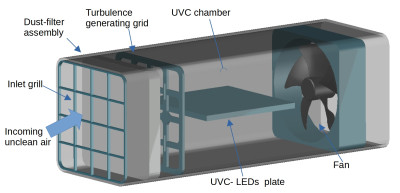News
Engineering solutions to mitigate airborne disease transmission in mid and low income countries
31 March 2023

In international collaboration, a group of master and PhD students, and academics from Queen Mary University of London (QMUL) in the UK, IIT Madras and VIT Chennai in India has published an innovative concept of air purifier design in the journal Fluids https://www.mdpi.com/2311-5521/8/4/111
The Covid pandemic has highlighted the need for non pharmaceutical solutions (in addition to pharmaceutical ones) in order to combat the spread of airborne diseases. In this joint international project between QMUL, IIT Madras, VIT Chennai and with the industrial partner Magento, along with the support of the Royal Academy of Engineering we are looking at the development and implementation of air purifiers for use in mid and low income countries.
Our design is based on the emerging light-emitting diode ultraviolet-C (LED-UVC) technology as illustrated in the figure. Instead of removing the pathogens from the air, the UVC damages the pathogen’s genetic material so it can no longer hurt us. The inactivation is pursued inside a closed box so the UVC light is not emitted outside to affect humans. A novel aerodynamic design is used to ensure that the airborne pathogens that cause diseases like Covid-19 and TB receive sufficient exposure to UVC to cause inactivation, while the LED technology is utilised to reduce power consumption.
Dr Avital of QMUL and the UK leader of this project said: “This high impact project has combined educational and research activities, providing international leading research opportunities for our senior master students. The development of this conceptional design will continue in this multi-year project and we expect to continue testing this design while developing implementation guidelines.”
Dr Motallebi of QMUL added “We are using high quality flow visualisation Schlieren system. The results will be published in the second phase. It is a pleasure working with committed students and getting high quality results”.
Prof Samad of IIT Madras and the India leader of this project continued to say “The Covid-19 pandemic was particularly difficult for India and exposed our vulnerability to airborne diseases. This project will provide some of the solutions to mitigate airborne disease transmission. I was very pleased to see how students from both countries worked together to produce high quality research”. Prof Venkatesan from VIT Chennai added “We are testing a demonstrator in the lab and plan to test it afterwards in real conditions. We will organise an international workshop on mitigation of airborne disease transmission, raising awareness and prompting research”. Finally, Prof Beggs of Leeds Beckett University who advised this project noted “While this UVC air purification technology is still under development, I have been impressed by the research carried by the engineering students both in the UK and India. I think they have made important steps forward”.
This project is to continue until January 2024, so stay tuned for further developments.
| People: | Eldad AVITAL |
| Research Centre: | Intelligent Transport |
Updated by: Eldad Avital




